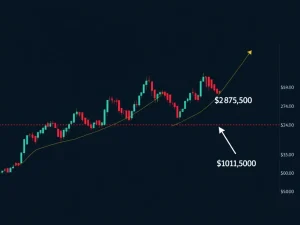Unlocking Trillions: Tokenizing Car Reservations Revolutionizes Automotive Industry

Car buyers often face immense frustration and uncertainty. Imagine putting down a significant deposit for a new vehicle, only to wait months or even years without a clear delivery date. This opaque system currently plagues the automotive industry, but a revolutionary solution is emerging. Tokenizing car reservations offers a path to unparalleled transparency and efficiency, promising to unlock a trillion-dollar market for both consumers and manufacturers.
The Broken Promise of Car Reservations Today
The current car reservation process is fundamentally flawed. When car manufacturers introduce a new model, their fragmented logistics and sales cycles create significant hurdles. Customers frequently pay deposits, yet they receive no reliable way to project their car’s delivery. Consequently, eager buyers often wait for extended periods, completely unaware of their position in the queue.
This lack of transparency directly leads to inflated prices. New models frequently command substantial markups over their sticker price when they first enter the market. Buyers face a stark choice: pay a considerable premium for immediate delivery or accept an unknown waiting period for the standard price. This system benefits neither the consumer nor, ultimately, the manufacturer.
Why Current Systems Fail Buyers and Manufacturers
The problem stems from deep-seated inefficiencies and information asymmetry. Dealers have, for example, reportedly charged buyers $30,000 to $70,000 markups on popular models like the Ford F-150 Lightning. This demonstrates a lucrative secondary market, thriving solely on the lack of clear information. Even without a formalized ‘black market,’ this situation persists.
Furthermore, manufacturers also suffer. A McKinsey report highlights that 15% to 30% of manufacturing capacity often sits idle. This occurs because smaller firms lack access to efficient, tradable reservation systems. Consider Tesla’s Cybertruck, which accumulated over 1 million reservations. Each reservation required a refundable deposit of up to $250, totaling over $200 million in dormant capital. This capital could instead fuel secondary-market liquidity, rather than remaining locked in corporate coffers.
Blockchain Automotive: A New Era of Transparency
Fortunately, blockchain automotive solutions provide an elegant answer to these long-standing issues. Smart contracts, built on blockchain technology, directly address problems associated with information asymmetry. These digital agreements automatically execute when predefined conditions are met, removing the need for intermediaries and fostering trust.
Tokenized flat reservations, for instance, can escrow deposits directly on-chain. This innovation allows buyers to freely trade their queue positions. At the same time, developers maintain steady sales momentum. The system ensures that all transactions are recorded immutably on a public ledger, creating an unprecedented level of transparency for all participants.
The Mechanics of Tokenized Waitlists
In this new paradigm, each car reservation becomes a unique digital asset, often represented as a Non-Fungible Token (NFT). These NFTs signify a specific position in a vehicle’s production queue. As a result, early adopters can sell their position if their preferences change or if demand for the model skyrockets. Manufacturers, moreover, can capture royalties on these secondary trades, creating an additional revenue stream.
The technical infrastructure for such a system already exists. BMW’s venture-capital unit has invested significantly in blockchain-based supply-chain solutions. Mercedes is piloting automated payment systems for car-charging networks. Mercedes’ parent company, Daimler, also explores decentralized identity, in-vehicle data sharing, and automatic payments for electric charging, utilizing blockchain in logistics and cost management. These initiatives pave the way for widespread adoption of tokenizing car reservations.
Unlocking the Trillion-Dollar Market Opportunity
The automotive sector presents a compelling case for reservation tokenization, particularly where phantom waitlists have long enabled abusive markups. This innovative approach could unlock a trillion-dollar market, fundamentally reshaping how vehicles are bought and sold. The potential extends far beyond simply cars.
Consider the ripple effects of this system. An order for a Tesla, once tokenized, could be traded based on production timelines, geographic delivery priorities, or even specific customizations. Prices would be set transparently by market demand, rather than being obscured by dealer markups. These build-to-sell slots would function much like call options in financial markets, granting holders the right, but not the obligation, to purchase later.
Beyond Cars: The Broad Impact of RWA Tokenization
The concept of RWA tokenization (Real-World Asset tokenization) is not limited to car reservations. According to Boston Consulting Group, the tokenization of real-world assets could reach a staggering $16.1 trillion. This figure spans diverse financial products, including insurance, pensions, alternative investments, home equity, infrastructure, and patents.
Redirecting even a fraction of that activity to real-world reservations creates new secondary markets. This includes hotel rooms, concert tickets, or unused factory time. For example, hotel chains could monetize no-shows through open resale markets. Healthcare providers might reduce MRI waste while earning fees from legitimate transfers. The success of NFT trading platforms, with OpenSea recording over $211 million in volume in February 2025 alone, demonstrates a clear appetite for tokenized assets.
Paving the Way for Transparent Waitlists
The primary benefit of this system lies in creating transparent waitlists. The current opacity breeds mistrust and enables predatory practices. By making queue positions tradable and visible, the entire ecosystem becomes fairer and more efficient. Early adopters can monetize their initial commitment, while latecomers can pay a premium for faster access, all within a regulated and clear framework.
Skeptics might dismiss this as over-engineering. However, the sheer scale of the problem and the potential market value suggest otherwise. The move towards tokenized systems is not merely about digitizing existing processes; it is about introducing market dynamics to an industry historically lacking transparency and liquidity. It creates value where none existed before, transforming dormant deposits into active capital.
Bridging the Gap: Seamless User Experience
For mass adoption, blockchain technology must become virtually invisible to the end-user. The goal is not to force users into crypto, but to embed blockchain’s inherent benefits into everyday interactions. Promising examples of this seamless integration already exist. Visa, for instance, experiments with gasless payments via Account Abstraction. Circle’s Verite enables users to prove compliance without revealing personal data. Magic Link offers email-based wallet access, simplifying the user journey significantly.
These innovations ensure that the security and efficiency of blockchain operate in the background. Users benefit from enhanced transparency and tradability without needing to understand the underlying cryptographic complexities. This focus on user experience will be critical for widespread adoption across various industries.
The Road Ahead for Tokenized Reservations
The journey of tokenization is still evolving. Nike’s temporary withdrawal from NFTs did not signal the end of tokenization; instead, it refined its focus. The next major breakthroughs will likely come from practical applications that solve tangible problems. This includes monetizing no-shows in hospitality, eliminating waitlist scalping in automotive, and optimizing resource allocation in healthcare.
The question is no longer whether tokenized reservations will reshape industries, but rather which sectors will move first. Those who act decisively to implement open, liquid booking systems will gain a significant advantage. They will not only solve long-standing problems but also unlock entirely new markets and revenue streams. The future of reservations is transparent, tradable, and tokenized.









